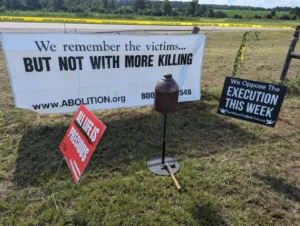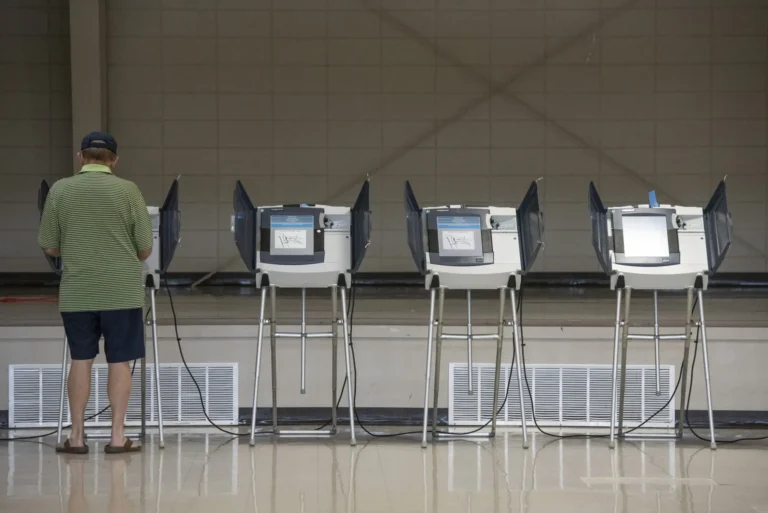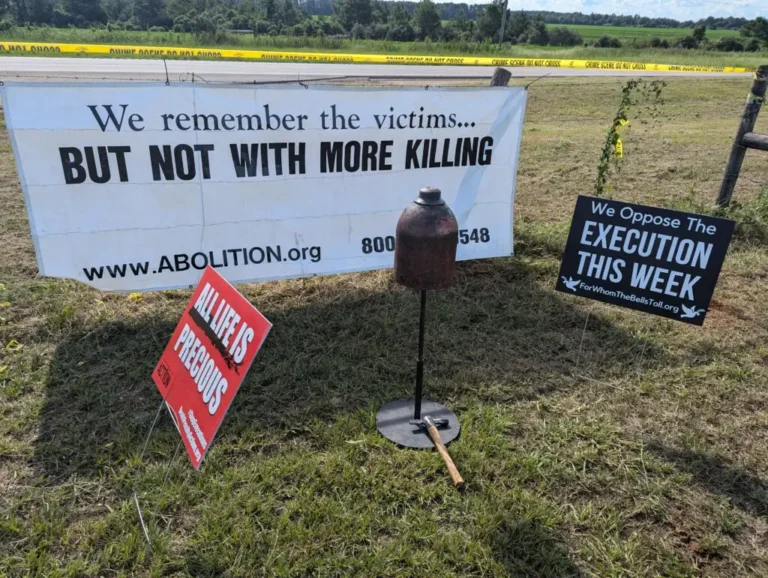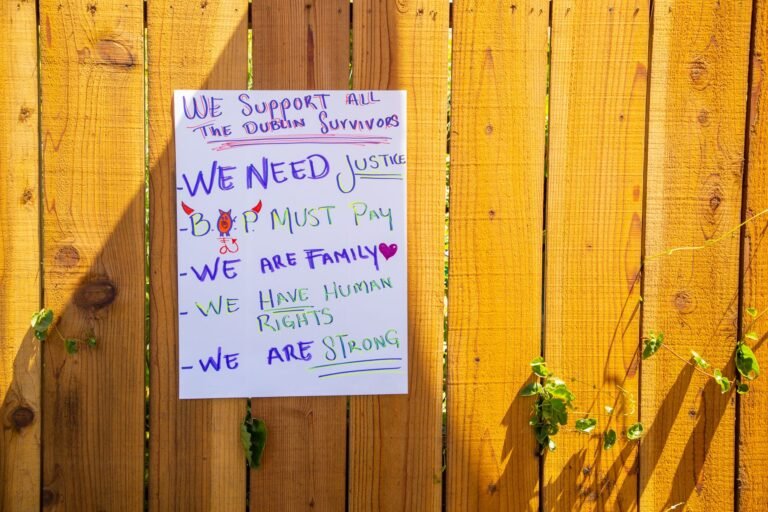Disagreement Among Tucson Sheriff Candidates Over Local-Federal Immigration Enforcement
Pascal Sabino | July 25, 2024

Update (July 31): Chris Nanos won the Democratic primary for sheriff on July 30.
This fall, Arizonans will have the opportunity to vote on a ballot measure that could expand the role of local police in border enforcement. The measure, introduced by Republicans, proposes giving local police the authority to arrest individuals suspected of being undocumented. This issue is also being debated at the local level, revealing significant divisions among Arizona law enforcement about how much they should collaborate with federal border agencies.
A key election next week will determine whether the leadership of a major border county will support increasing partnerships with the Border Patrol in the coming years.
Operation Stonegarden, a federal grant program that provides local police with funding and equipment for border region patrols focused on immigration enforcement, has become a contentious issue in the race for sheriff of Pima County, which includes Tucson. Incumbent Sheriff Chris Nanos supports the county’s decision to withdraw from the program several years ago, while his opponent in the July 30 Democratic primary, Sandy Rosenthal, advocates for rejoining Operation Stonegarden.
Rosenthal, a former deputy with the Pima County Sheriff’s Office and Nanos’ challenger, has criticized Nanos for leaving the Stonegarden funding behind. She argues that this decision has contributed to budget and staff shortages and worsening conditions at the jail. At a candidate forum in June, Rosenthal suggested that rejoining Stonegarden could help address drug trafficking issues, such as fentanyl, which she claims is exacerbated by a lack of border patrol presence.
“It allows us to get more deputies out in the farther reaches of Pima County,” Rosenthal said at the forum. “When you give up an area, when you give up a responsibility, bad things happen. The cartels benefit from the current lack of enforcement along the border.” Rosenthal did not respond to requests for comment.
Sheriff Nanos has expressed skepticism about local law enforcement’s role in border enforcement, citing the U.S. Supreme Court’s stance that border security is primarily a federal responsibility. He argues that Operation Stonegarden did not benefit Pima County directly since patrols typically occurred in remote areas with minimal crime. According to Nanos, less than 1 percent of emergency calls his office receives come from the border area. He also notes that fentanyl smuggling primarily occurs through legal ports of entry, not through the open desert.
“That grant didn’t benefit the community,” Nanos told Bolts. “It benefited the Border Patrol by providing them with additional personnel. Officers assigned to Stonegarden worked under Border Patrol’s command and used their resources.”
Public officials often use border issues as a stand-in for broader local concerns, such as drug-related crime, Nanos noted. Fears of increased fentanyl trafficking linked to migration have been amplified by national rhetoric, but research shows that immigrants commit less crime than U.S.-born citizens, and fentanyl smuggling is predominantly done through legal ports of entry. According to the U.S. Sentencing Commission, 89 percent of convicted fentanyl traffickers are U.S. citizens.
Adelita Grijalva, chair of Pima County’s Board of Supervisors and an opponent of Stonegarden grants, expressed concern about the potential return of such programs. More than a third of Pima County’s population is Hispanic, and Grijalva fears that reintroducing Stonegarden could lead to racial profiling and targeting of people based on their appearance.
“People of color, especially Latinos, could face increased suspicion and targeting based on their looks,” Grijalva said. “The idea of our local sheriff’s office engaging in enforcement based on such assumptions is troubling.”
Local opposition to the Stonegarden program and similar federal policies has been driven by a long-standing immigrant rights movement in Arizona. The controversial “show me your papers” law signed by then-Governor Jan Brewer in 2010 allowed police to detain individuals for not having immigration documents, leading to accusations of racial profiling and significant hardships for immigrants.
The law had severe impacts on the immigrant community, as Tony Pineda from the Southside Worker Center described. The center, which provides support for day laborers, saw firsthand the negative effects of the law on immigrant families, despite efforts to provide legal and practical assistance.
“This law made life incredibly difficult for undocumented individuals and their families,” Pineda said. “It had a profound impact on the community, both for those without papers and for those who were established but still felt the repercussions.”
The backlash against the 2010 law laid the groundwork for future resistance, with community groups and immigrant rights organizations working together to challenge such policies. The mobilization continued with significant opposition to the Trump administration’s zero-tolerance policy in 2018, which led to widespread condemnation of family separations and harsh detention conditions.
Pineda noted that these policies affected not just undocumented immigrants but also their families and communities, generating a broad-based response against anti-immigrant sentiment and inhumane practices.
“The impact was felt throughout the community, not just by those directly affected but by everyone who saw the harm being done,” Pineda said.

As the family separation crisis became a symbol of federal immigration policy, attitudes in Pima County towards border authorities grew increasingly negative, according to Isabel Garcia, co-founder of the Coalición de Derechos Humanos and former Pima County Legal Defender. This shift in sentiment heightened pressure on local officials to distance their police forces from border enforcement duties, Garcia said.
“We organized numerous protests and held large demonstrations in front of the federal courthouse,” Garcia recalled. “The widespread public outrage was a powerful force. We realized that local officers involved in the Stonegarden program were effectively working under Border Patrol’s command and following their directives.”
Garcia noted that the Stonegarden program undermined public trust in law enforcement, causing many people to stop reporting crimes or calling 911 due to fears of arrest and deportation.
Similar concerns have been raised by immigrant rights activists across the country. In neighboring Maricopa County, Sheriff Joe Arpaio transformed his department into an extension of federal immigration agencies during his tenure from 1993 to 2017. His approach led to a 2007 legal challenge, resulting in a federal court finding that Arpaio’s office engaged in racial profiling and mandated reforms to address discriminatory practices.
Critics of the Stonegarden program in Pima County argue that it did little to improve public safety and led to the unnecessary detention and harassment of many people, particularly Latino drivers, over their immigration status.
“The program led to numerous stops and arrests solely for immigration checks,” Garcia said. “Even as a lawyer and a citizen, I feel the fear of injustice when stopped. The program’s impact was deeply troubling.”
In 2018, the Pima County Board of Supervisors, despite objections from the then-Republican sheriff, voted to end participation in Operation Stonegarden. Over the previous 12 years, the county had received around $16 million from the program. Board members who opposed the grants expressed concerns that the program’s restrictions on using funds for humanitarian aid and its potential to erode trust in local law enforcement outweighed its benefits.
The City of Tucson also withdrew from the Stonegarden program in 2020, citing federal officials’ refusal to allow the use of grant funds for humanitarian aid. Tucson’s police chief at the time said that the program was “not a great fit” for the city’s needs. Meanwhile, the neighboring town of Marana continues to participate in Operation Stonegarden, using the funds to patrol rural areas believed to be used by smugglers and drug cartels.
Currently, the Pima County Board of Supervisors, which has a Democratic majority, does not support rejoining Operation Stonegarden. Although the board’s composition could change with the upcoming elections, and a new sheriff might advocate for increased immigration enforcement, the board’s current stance reflects a cautious approach toward federal immigration programs.
As all seats on the board are up for election this year, the board’s position may shift depending on the outcomes in November. A new sheriff prioritizing immigration enforcement could potentially influence the board’s stance, especially if there are changes at the federal level.

The winner of next week’s Democratic primary between incumbent Sheriff Chris Nanos and challenger Sandy Rosenthal will face one of three Republican candidates—Bill Phillips, Heather Lappin, or Terry Frederick—in the November general election. All three GOP candidates have advocated for stricter immigration enforcement policies. While Pima County generally leans Democratic, and the Democratic nominee is expected to have an advantage, Republicans have won local elections, including the sheriff’s office, as recently as 2016.
In addition, advocacy groups are mobilizing to oppose Proposition 314, a measure on the November ballot that would grant state and local law enforcement authority to arrest individuals suspected of being undocumented immigrants. Opponents of the measure are currently engaged in litigation to try to remove it from the ballot. Both Nanos and Rosenthal have publicly opposed Proposition 314.
Adelita Grijalva, chair of the Pima County Board of Supervisors, is confident that voters in Pima County will support officials who oppose increasing enforcement measures.
“Positions on Stonegarden have been a significant factor for many voters,” she told Bolts. “Pima County values humanitarian principles, justice, and community safety.”
Correction (July 26): An earlier version of this story incorrectly stated that Grijalva had endorsed Nanos’ reelection bid; she has not.

















+ There are no comments
Add yours